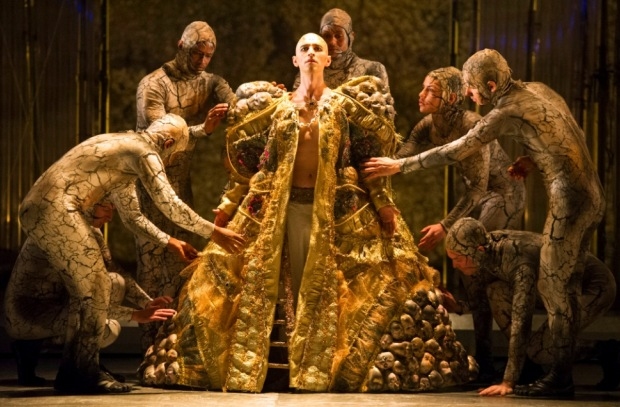Akhnaten (London Coliseum)

© Richard Hubert Smith
Akhnaten depicts the life of a young Pharaoh who dared to replace polytheism with monotheism (many gods with a single deity) and thereby provoked the wrath of the people. Just the thing for a spot of operatic 'passione', you might think…
No.
Aida it isn’t; but then you don’t go to Glass and complain he’s not Verdi. Akhnaten is an evening of musical waves lapping on the beaches of the mind, always pleasant on the ear and often very beautiful. Chugging motifs, as often as not repeated arpeggios spiced with crunchy major-minor clashes and sweet modulations, are unfailingly hypnotic here even though in other Glass works I tend to find they pall. The ritualised nature of Akhnaten's dramatic material helps, a characteristic that this enthralling interpretation seizes upon.
Unlike Glass, McDermott is never predictable. To create a visual representation of abstract faith he has turned to ancient Egyptian wall painting, which is where the the jugglers comes in. (We see them, in a programme photo, depicted large as life in an ancient tomb.)
Whereas in Anatole France’s novel Le Jongleur de Notre Dame a destitute monk offers his juggling to the Virgin Mary as the only gift he can afford, here the synchronised skills of Sean Gandini and his troupe represent faith itself – and, at a climactic moment of pure theatre, the loss of faith.
'Forces of beauty'
Not everything works. The jugglers’ onesies make them look like reptilian mummies, and when they swap balls for skittles it takes on the appearance of a 'cirque du dieu soleil'. Besides, if I'm honest, a night of juggling grows repetitive no matter how skilfully it’s done.
For the rest, stately movement is the order of the day, much of it lateral, all of it rehearsed to within an inch and executed with riveting precision by the fabulous ENO Chorus and an impeccable company of solo singers.
Glass creates two sets of harmonised trios: in the Pharaoh’s corner we find Akhnaten himself (Anthony Roth Costanzo) along with his wife, Nefertiti (Emma Carrington) and mother, Tye (Rebecca Bottone). The voices of dissent, presented as archetypes from the church, the military and the state, are sung by Colin Judson, James Cleverton and Clive Bayley. All are superb, but Costanzo is extraordinary as much for his physical acting as his singing.
The young American spends much of the first act naked (it might as well be subtitled ‘Pharaoh gets dressed’) and he exercises perfect muscle control when negotiating motor challenges such as climbing steps in ultra-slo-mo. While his voice may be less ample than some of his countertenor colleagues, he uses it with expressive force and lyricism in his second-act hymn.
In a memorable evening for the company, Karen Kamensek conducts a taut, urgent account of Glass’s score and the ENO Orchestra responds with disciplined brilliance. Zachary James is saddled with some cheesily histrionic narration that gets in the way, but mostly it’s the forces of beauty that triumph. Tom Pye‘s three-tier designs are bold yet simple and Bruno Poet lights them… well, poetically. As for Kevin Pollard‘s exquisite costumes, they bridge the gap between ancient and modern just as the opera itself does. It’s surely no coincidence that, by the end of his life, Akhnaten the outcast resembles Gandhi.
Akhnaten runs in repertory at the London Coliseum until 18 March.










